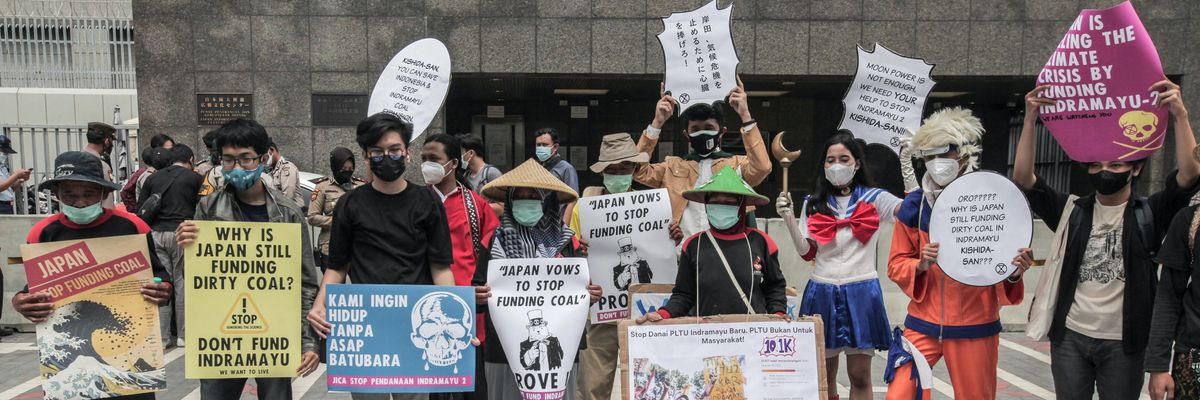Wealthy nations are spending money under the guise of "climate finance" to fund projects that have little or nothing to do with tackling the climate crisis and—as in the case of three Japanese-backed coal plants—are sometimes fueling the planetary emergency, according to a Reutersinvestigation published Thursday.
While media outlets including Reuters have recently reported that rich countries are on track—albeit long overdue—to finally meet their 2009 pledge to invest $100 billion annually in climate financing by 2020, the new Reuters investigation shows that governments are funding climate-harming projects and counting the expenditures toward their giving total.
"This is the wild, wild West of finance," Mark Joven, an undersecretary in the Philippines Department of Finance and the country's lead climate negotiator, told Reuters. "Essentially, whatever they call climate finance is climate finance."
The Japanese government has lent at least $9 billion for projects that are dependent upon fossil fuels. These include a 1,200-megawatt coal-fired power plant in Matarbari, Bangladesh, coal plants in Vietnam and Indonesia, and a new terminal at Egypt's Borg al-Arab Airport. The Matarbari plant is expected to add 6.8 million tons of carbon dioxide to the Earth's atmosphere every year, while the airport terminal is forecast to increase outbound flight emissions by about 50% over 2013 levels.
Japanese officials have attempted to justify the investments by portraying the coal plant as an improvement because it uses Japanese technology that generates more energy with less coal, while calling the new terminal an "Eco-Airport" replete with energy-saving solar panels, high-efficiency air conditioning, and LED light bulbs.
However, Wayne King, director of climate change for the Cook Islands—a self-governing South Pacific nation in free association with New Zealand—took exception with Japan's characterization.
"Basically, that's a development project," King said of the Egyptian airport project. "You can't count it, because the motivation is wrong."
Other examples of questionable climate financing in the Reuters report include an agreement by the United States to loan $19.5 million to the developers of a Marriot hotel in Cap-Haïtien, Haiti; a Belgian backing of an Argentinian film about a man who works to destroy forests for a paper company before falling in love with an environmental activist; and a $4.7 million Italian investment in a chain of chocolate and gelato shops across Asia.
According to the report:
Some countries count projects that never happened toward climate finance goals. France reported a $118.1 million loan to a Chinese bank for environmental initiatives, as well as loans totaling $267.5 million for upgrades to a metro system in Mexico and $107.6 million for port improvements in Kenya. Each project was subsequently canceled with no funds paid out, according to the French Development Agency. Similarly, the U.S. reported $7 million in insurance coverage for a hydropower project in South Africa that never happened.
Iqbal Kabir, an official in the Bangladeshi Ministry of Health and Family Welfare, told Reuters that "people deserve more" than the misallocation of climate funds for projects like coal plants, while criticizing countries that are "spending [climate funds] on other projects, depriving the issues like women's health, children's health, and salinity intrusion."
Matthew Samuda, a minister in Jamaica's Ministry of Economic Growth and Job Creation, added that "if we are telling ourselves we are spending money and investing in our future in a way that we are not, then we are courting disaster."
